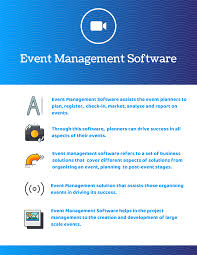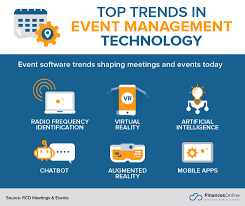The Power of Event Software: Enhancing Your Gatherings
Hosting a successful event requires meticulous planning, coordination, and execution. In today’s digital age, event software has revolutionized the way we manage and organize gatherings of all sizes. From conferences and trade shows to weddings and parties, the right event software can streamline processes, enhance attendee experience, and maximize efficiency.
Key Features of the Best Event Software:
- Online Registration: Simplify the registration process for attendees with user-friendly online registration forms.
- Event Marketing Tools: Promote your event through email campaigns, social media integration, and personalized marketing materials.
- Agenda Management: Create and customize event agendas, schedule sessions, and manage speakers effortlessly.
- Networking Opportunities: Facilitate networking among attendees through matchmaking tools, chat features, and virtual meeting rooms.
- Data Analytics: Gain valuable insights into attendee behavior, engagement metrics, and event performance with robust analytics tools.
The Top Event Software Solutions in the Market:
When it comes to choosing the best event software for your needs, several top-notch solutions stand out in the market. From industry-leading platforms like Cvent and Eventbrite to innovative newcomers like Bizzabo and Whova, there is a wide range of options to suit every budget and requirement.
No matter the size or scope of your event, investing in quality event software can make a significant difference in its success. With advanced features designed to streamline processes, engage attendees, and deliver measurable results, the best event software is a must-have tool for any modern event planner.
Top 9 Benefits of Using the Best Event Software for Seamless Planning and Execution
- Streamlines event planning processes for increased efficiency
- Enhances attendee experience with user-friendly interfaces
- Facilitates online registration and ticketing for seamless attendee management
- Provides comprehensive event marketing tools to maximize reach and engagement
- Offers customizable agenda management features for organizing sessions and speakers
- Enables networking opportunities through matchmaking tools and virtual meeting rooms
- Delivers valuable data analytics insights for measuring event success and ROI
- Integrates with other software systems for seamless data sharing and workflow automation
- Improves overall event organization, coordination, and execution
Top 4 Drawbacks of Leading Event Software: Steep Learning Curve, High Costs, Technical Glitches, and Limited Customization
Streamlines event planning processes for increased efficiency
Utilizing the best event software streamlines event planning processes, leading to increased efficiency and productivity. By automating tasks such as registration management, agenda scheduling, and attendee communication, event planners can save valuable time and resources. With streamlined processes in place, organizers can focus on enhancing the overall event experience for attendees and achieving their event goals effectively.
Enhances attendee experience with user-friendly interfaces
One of the key advantages of utilizing the best event software is its ability to enhance attendee experience through user-friendly interfaces. By providing intuitive and easy-to-navigate platforms, event software ensures that attendees can effortlessly access event information, register for sessions, engage with interactive features, and connect with other participants. This seamless user experience not only improves overall satisfaction but also encourages active participation and interaction, ultimately contributing to the success of the event.
Facilitates online registration and ticketing for seamless attendee management
One of the key advantages of utilizing the best event software is its ability to facilitate online registration and ticketing, providing a seamless experience for managing attendees. By offering a user-friendly platform for attendees to register and purchase tickets online, event organizers can streamline the registration process, reduce manual paperwork, and ensure accurate attendee data collection. This feature not only enhances convenience for participants but also enables organizers to efficiently track attendance numbers, manage ticket sales, and optimize event logistics with ease.
Provides comprehensive event marketing tools to maximize reach and engagement
The best event software offers a valuable pro by providing comprehensive event marketing tools that are essential for maximizing reach and engagement. These tools enable event organizers to promote their gatherings effectively through targeted email campaigns, social media integration, and personalized marketing materials. By leveraging these features, organizers can enhance attendee engagement, boost registration numbers, and ultimately make their events more successful and memorable.
Offers customizable agenda management features for organizing sessions and speakers
One of the key advantages of utilizing the best event software is its ability to provide customizable agenda management features for organizing sessions and speakers. This feature allows event planners to create tailored agendas, schedule sessions efficiently, and manage speakers seamlessly. By customizing the agenda to suit the specific needs of the event, organizers can ensure a smooth flow of activities, enhance attendee engagement, and deliver a memorable experience for all participants.
Enables networking opportunities through matchmaking tools and virtual meeting rooms
One key advantage of utilizing the best event software is its ability to facilitate networking opportunities through innovative features such as matchmaking tools and virtual meeting rooms. By leveraging these tools, event organizers can connect attendees with like-minded individuals, industry experts, and potential collaborators, fostering valuable relationships and enhancing the overall attendee experience. Whether it’s through targeted introductions or virtual networking sessions, event software empowers participants to engage with each other in meaningful ways, ultimately maximizing the networking potential of any gathering.
Delivers valuable data analytics insights for measuring event success and ROI
One of the key advantages of utilizing the best event software is its ability to deliver valuable data analytics insights for measuring event success and return on investment (ROI). By leveraging advanced analytics tools, event planners can gain deep insights into attendee behavior, engagement metrics, and overall event performance. This data-driven approach not only allows for a more comprehensive understanding of event outcomes but also enables informed decision-making to optimize future events and maximize ROI.
Integrates with other software systems for seamless data sharing and workflow automation
One of the key advantages of utilizing the best event software is its ability to seamlessly integrate with other software systems, enabling efficient data sharing and workflow automation. By connecting with CRM platforms, marketing tools, and analytics software, event software streamlines processes and ensures that information flows smoothly across different systems. This integration not only enhances data accuracy and consistency but also automates repetitive tasks, saving time and resources for event organizers. Ultimately, the seamless integration of event software with other systems leads to improved efficiency, enhanced collaboration, and a more cohesive event planning experience.
Improves overall event organization, coordination, and execution
Utilizing the best event software significantly enhances overall event organization, coordination, and execution. By centralizing all aspects of event planning and management in one platform, event organizers can streamline tasks, allocate resources efficiently, and ensure seamless communication among team members. From creating detailed schedules and managing attendee registrations to coordinating logistics and tracking progress in real-time, the robust capabilities of top event software solutions empower planners to orchestrate events with precision and effectiveness.
Steep Learning Curve
One notable drawback of some of the best event software solutions is the steep learning curve they present. With a complex interface that demands time and effort to master, users may face challenges in navigating the system efficiently. This can lead to delays in event planning and execution, as well as potential frustration for users who are not tech-savvy. Despite offering advanced features and functionalities, the intricate nature of these platforms may deter some users from fully leveraging their capabilities.
Costly Investment
One notable downside of investing in the best event software is the high cost associated with acquiring top-quality solutions. While these software packages offer advanced features and functionality, their premium pricing can be a barrier for small-scale events or organizations with limited budgets. The significant investment required to purchase and implement high-quality event software may deter some event planners from accessing the full range of benefits that these tools can provide, ultimately impacting the overall success and efficiency of their events.
Technical Issues
One notable drawback of utilizing event software is the potential for technical issues to arise. Similar to any digital tool, event software may experience technical glitches or compatibility issues that can impede the seamless planning and execution of an event. These disruptions can lead to delays, frustration among organizers and attendees, and even impact the overall success of the gathering. It is essential for event planners to be prepared to troubleshoot such issues promptly and have contingency plans in place to mitigate any potential disruptions.
Limited Customization
While top event software offers a plethora of features to streamline event planning and management, a notable con is the limited customization options available. Despite the comprehensive tools and functionalities provided by these platforms, some aspects may lack the flexibility needed to tailor the software to meet specific and unique event requirements. This limitation can pose challenges for event organizers seeking highly personalized solutions that align closely with their event goals and branding strategies. As such, careful consideration of customization capabilities is essential when selecting the best event software to ensure it adequately meets the distinct needs of each event.





